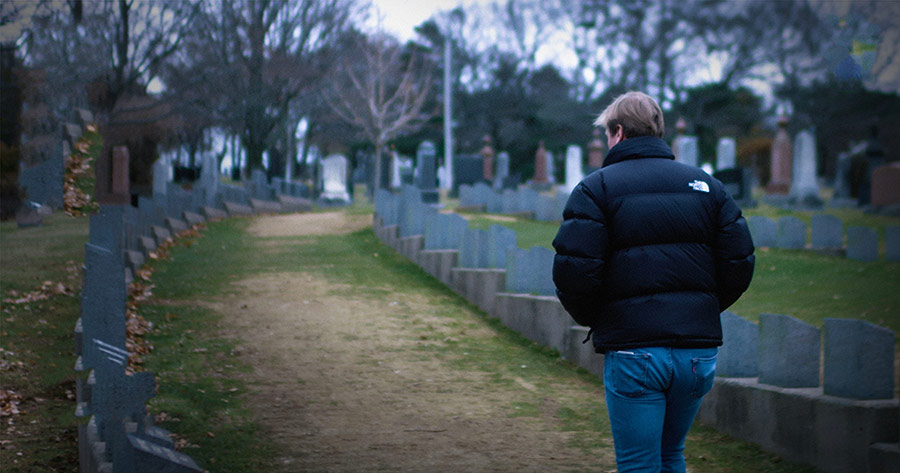Documentary reveals untold story of six Chinese survivors on Titanic

The documentary features one of its major creators, Steven Schwankert, a US researcher, visiting the Titanic section of Fairview Lawn Cemetery in Halifax, Nova Scotia, Canada. [Photo provided to China Daily]
They were reassigned from a freighter docked in New York bound for Cuba by the company that had hired them.
Considering that the average survival rate for third-class male passengers was less than 20 percent, Schwankert says he believes the 75 percent survival rate of the Chinese workers was due to their experience traveling by sea.
"They had a particular understanding of what was happening on the ship. As sailors, they would know that the best thing to do is to get near the lifeboats early. We think they got onto the deck and took their opportunity when the boats were almost leaving," Jones says.
With experiments that ranged from building a full-size lifeboat and using 3D software to simulate the escape route, the documentary dispels rumors that the Chinese survivors donned women's dresses to hide as stowaways in the lifeboats.
"All those rumors are very unfair. The one thing we should remember about the Titanic is that there were spaces on all of the lifeboats. Some of the lifeboats from the Titanic were not even half full," says Jones. "Is it wrong to try to survive?"

The documentary's production team traveled to 20 cities and interviewed more than 100 people over five years. [Photo provided to China Daily]
The most thought-provoking part of the documentary is not just what happened to the Chinese passengers, but their poignant life paths as early-generation immigrants struggling against discrimination and racism, as well as fears that they might be forced to lose everything they had strived for.
"Nobody ever claimed them. Nobody ever talked about them. …There is a deep psychological wound that the generation suffered, which is not just about 'can I survive?' or money. There's something else that sits inside their hearts or minds," says Jones, adding that many Chinese immigrant laborers didn't get married, with their families ending with them.
The most highlighted survivor in the documentary is Fang, who had not told his survival story to his family with whom he later lived in the US.
The production team found limited records on the lives of the six survivors after the disaster other than their movement to different countries.
In 2019, when the documentary was in postproduction, Jones and Schwankert were watching a scene in Cameron's film Titanic about a young Chinese man floating with a piece of wood. The shot was among more than 20 scenes cut from the theatrically released version, but kept in DVD copies. Realizing that the character could be the archetype of Fang in their project, Jones contacted a lawyer of Cameron, and was surprised to learn that Cameron had heard about their documentary and was willing to accept their interview.

[Photo provided to China Daily]
"We wanted to know how Cameron knew about this story. Why did he film it? Why did he delete it? We had a lot of questions," says Jones, who flew to meet Cameron in New Zealand along with Schwankert.
"Cameron was very helpful. He knows so much about the Titanic. He told us that the story of Fang Lang had been a big influence on his movie. He had a lot of opinions about discrimination against Chinese people and the problems of racism," Jones says, adding that Cameron cut the scene as it looked like an unnecessary repetition of the scene with Rose and Jack, which would affect the storytelling pace.
Cameron offered free footage from his movie to the duo and became the executive producer of the documentary that retells the ship's story from a Chinese perspective.
"Every generation after the sinking of the Titanic kind of uses the ship as a way to talk about society," says Jones, adding that the disaster brought out issues such as class discrimination.
Their documentary wants to show "issues of ethnicity and nationality and how that affects people's lives".
By Xu Fan